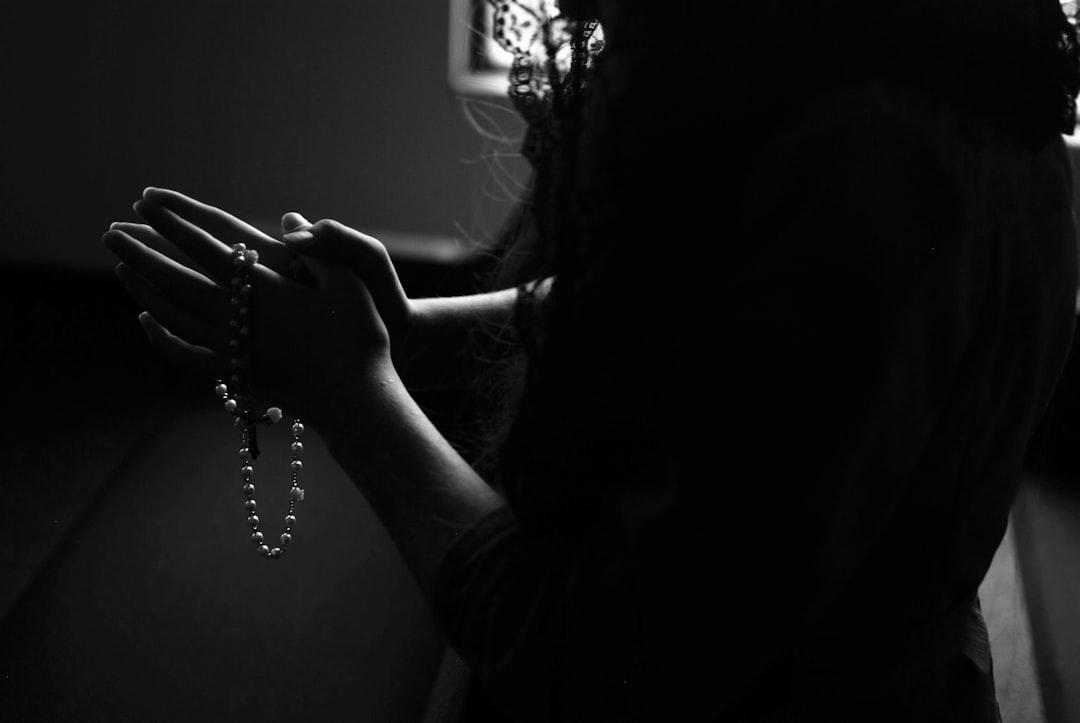Faith and religion often guide our lives, but what happens when we start questioning what we’ve been taught? Is it right or wrong to question God? In this post, we’ll explore the different perspectives and implications of examining our beliefs. Whether you’re struggling with doubt or seeking intellectual curiosity, read on to learn more.
The Role of Faith and Religion in Our Lives

Religion has been a fundamental aspect of human civilization, serving as a source of comfort, guidance, and hope for billions of people worldwide. Faith, whether in a divine being, higher power, or religious doctrine, can provide individuals with a sense of purpose, belonging, and assurance. It can shape their values, worldview, and responses to life’s challenges. Religion offers a framework for understanding the human condition, life, and death, and provides a sense of meaning and order in an often chaotic world.
Moreover, religion often brings individuals together, creating a community built on shared beliefs, values, and traditions. It provides individuals with a sense of belonging, and the opportunity to connect with others who share similar faith and beliefs. Additionally, religion often fosters a sense of service and compassion, encouraging individuals to dedicate themselves to helping others.

While faith can bring many benefits, it can also be a source of conflict and controversy. Differences in religious beliefs have sparked countless debates and even led to wars. Religious doctrine and cultural norms can often be contradictory to personal convictions, leading individuals to question and doubt their faith.
In conclusion, the role of faith and religion in our lives is essential but requires a delicate balance. It can provide individuals with a framework for understanding the world and offer a sense of belonging. However, it is important to recognize that these beliefs are personal convictions and can differ from cultural norms or religious doctrine. It is perfectly acceptable to question our faith, as it allows us to expand our understanding and deepen our own personal convictions. Overall, the role of faith and religion in our lives is vital and requires careful consideration and thoughtful reflection.
Key takeaways:
- Religion has been a fundamental aspect of human civilization, providing individuals with a sense of purpose, belonging, and assurance.
- Faith can shape one’s values, worldview, and responses to life’s challenges.
- Religion often brings individuals together, creating a shared community built on faith and values.
- While faith can bring many benefits, it can also be a source of conflict and controversy, requiring a delicate balance.
- It is perfectly acceptable to question our faith, as it allows us to expand our understanding and deepen our own personal convictions.
How Doubt and Spiritual Crisis Can Arise
It is not uncommon for individuals to experience doubt or spiritual crisis in their lives. This can happen for a variety of reasons, such as a traumatic experience, a loss of faith in a particular teaching, or a search for truth and meaning in one’s life. Doubt can be a challenging experience, but it can also lead to a deeper understanding of one’s beliefs and spirituality.
The first step in addressing doubt and spiritual crisis is to acknowledge that it is a natural part of the human experience. Faith and religion can provide a sense of comfort and stability, but it is important to understand that questioning and challenging one’s beliefs is a normal process that can lead to growth and understanding.
When doubt and spiritual crisis arise, it is important to seek help and guidance from trusted sources, such as clergy or spiritual advisors. These individuals can provide support and help address any questions or concerns that may arise. Additionally, seeking out resources such as books and online communities can also be beneficial in exploring one’s beliefs and spirituality.
At the same time, it is important to approach doubt and spiritual crisis with an open mind and heart. Challenging theology and questioning religious doctrine can be a positive experience, but it can also be a difficult and uncomfortable process. Remaining open to new ideas and perspectives can help individuals navigate this process and ultimately come to a deeper understanding of their beliefs.
It is worth noting that doubt and spiritual crisis do not necessarily lead to a rejection of faith or religion. Many individuals find that their questioning and challenging of their beliefs ultimately leads to a stronger and more authentic faith. Others may find that their spiritual journey takes them in a different direction entirely, such as atheism or agnosticism. Regardless of the outcome, it is important to approach doubt and spiritual crisis with curiosity, openness, and a willingness to learn.
In conclusion, doubt and spiritual crisis can be challenging experiences, but they can also lead to a deeper understanding of one’s beliefs and spirituality. Seeking guidance from trusted sources, remaining open to new perspectives, and approaching the process with an open mind and heart can all be beneficial in exploring one’s beliefs and spirituality.
Challenging Theology: The Positive and Negative Aspects

As a person of faith, it’s natural to question theology from time to time. After all, religious doctrine can be complicated and convoluted. However, challenging theology can be both positive and negative, depending on your approach and intent.
Here are some of the positive aspects of questioning theology:
-
Encourages Critical Thinking: Questioning theology invites us to think deeply and critically about our beliefs. It helps us to consider other viewpoints, examine evidence, and wrestle with tough questions. This can strengthen our faith and deepen our understanding of God.
-
Fosters Intellectual Curiosity: By engaging in theological debates and discussions, we become more knowledgeable and curious about our faith. As we explore difficult questions, we might discover new insights and perspectives that can teach us a lot about ourselves and the world around us.
-
Provides a Path to Growth: Challenging theology can lead to personal growth. When we confront doubts and uncertainties about our faith, we are forced to seek answers and build new insights. This can lead to a deeper sense of purpose and a stronger connection to God.
On the other hand, questioning theology can also have some negative aspects:
-
Challenges Faith: Challenging theology can be unsettling, especially if you’re struggling with doubts about your faith. Slipping into an existential crisis is an entirely expected outcome, but try and find support during this time.
-
Disrupts Cultural Norms: Questioning theology can also create tension between a person’s personal convictions and their cultural norms. It may be necessary to navigate gray areas skillfully to avoid causing conflict and harm.
-
Challenges Authority: Finally, challenging theology can bring up doubts about religious authority figures. Clergy serve as very influential role models and what they say or do has a significant impact on followers. This may lead you to question the wisdom of the people in charge of your denomination or church.
Challenging theology can be positive or negative, depending on how you approach it. It’s essential to remain curious, open-minded and continue to search for truth as you navigate your faith journey.
The Different Perspectives of Atheism, Agnosticism, and Skepticism
When it comes to questioning the existence of God, there are many different perspectives that people can have. Atheism, agnosticism, and skepticism are three common viewpoints that people may have when it comes to the question of whether or not God exists.
Atheism is the belief that there is no God or divine being. This belief often comes from a lack of evidence or personal experience with a higher power. Some atheists may also reject religion because of the negative consequences that organized religion has had on society or as a result of religious dogma that they find difficult to accept.
« Understanding Biblical Perspectives on Anal Sex: What the Scriptures Teach
Discovering the Heart of Christian Leadership: Principles, Qualities, and Values »
Agnosticism, on the other hand, is the belief that it is impossible to know whether or not God exists. People who are agnostic typically do not claim to know whether or not there is a higher power, but rather they believe that it is unknowable. Agnostics may feel that the evidence is too inconclusive or that the nature of God is beyond human comprehension.
Skepticism is the belief that claims should be supported by evidence and that ideas should be tested in order to be believed. People who are skeptical of religion may have a difficult time accepting religious doctrine without evidence. They may be more likely to believe in science and empirical evidence rather than faith.
It is important to note that while these perspectives can be helpful in understanding different beliefs, they are not mutually exclusive. Some people may identify as both agnostic and skeptical, or as atheistic and skeptical.
Regardless of one’s perspective, questioning the existence of God can be a deeply personal and difficult process. It often involves grappling with difficult questions about the nature of the universe, humanity’s place in it, and the afterlife. It may also involve questioning religious doctrine, cultural norms, and personal convictions.

As a youth pastor, it is important to create a safe space for questioning and doubt within the community. Encourage young people to ask questions and explore different perspectives, while also providing support and guidance as they navigate their own beliefs. Remember that the search for truth and the exploration of spirituality is a deeply personal journey that each individual must take on their own terms.
Personal Convictions versus Cultural Norms: Navigating the Gray Areas
As a member of a religious community, it can be difficult to reconcile your personal beliefs with the larger cultural norms of your faith. This can be especially challenging when it comes to questioning God and the religious doctrine that you have been taught. It is important to remember that it is okay to have doubts and ask questions, even if it goes against the cultural norms of your community. Here are some tips on how to navigate this gray area:
-
Seek out resources – If you are struggling with your beliefs, it can be helpful to seek out resources that align with your own personal convictions. This can include books, podcasts, or other forms of media that explore alternative perspectives on theology and spirituality.
-
Talk to trusted friends and mentors – Talking to others who have gone through similar experiences can be extremely beneficial in navigating the gray areas of questioning God. It is important to find people who will listen and support you without judgment.
-
Engage in critical thinking – Avoid taking everything you are taught at face value. Instead, engage in critical thinking and ask questions when something does not seem right. Critical thinking is an important tool for navigating the gray areas of questioning God.
-
Understand your personal convictions – Spend time exploring your own personal convictions and beliefs. This can be difficult, but it is important to understand what you truly believe in and how that aligns with the cultural norms of your community.
-
Embrace the journey – Remember that questioning God is a journey, and it is okay to not have all the answers. Embrace the process and allow yourself to explore alternative perspectives and beliefs.
Navigating the gray areas of questioning God can be challenging, but it is important to remember that you are not alone. Seek out resources and support, engage in critical thinking, understand your personal convictions, and embrace the journey. By doing so, you can find peace and clarity in your faith.
The Broader Implications of Questioning God on Morality, Ethics, and Society
As human beings, we question everything in our lives, including God and faith. Some people claim that questioning God is wrong and disrespectful while others see it as an essential part of their search for truth and meaning. Whichever side of the coin you’re on, it’s essential to consider the broader implications of questioning God on morality, ethics, and society.

At the heart of every religion is a set of moral and ethical principles. These principles are meant to guide believers on how to lead fulfilling lives and interact with others in ways that promote peace, love, and harmony. But what happens when you start questioning these principles and the beliefs that underpin them? Does it mean you’re rejecting everything you were raised to believe in?
The truth is, questioning God and faith can lead to a deeper understanding of your spiritual beliefs. When you challenge the theology and religious doctrine you were taught as a child, you open your mind to new possibilities and perspectives. At the same time, this process can be unsettling, as it often creates an existential crisis that challenges your notions of free will, personal conviction, and cultural norms.
However, the implications of questioning God go beyond your own spiritual journey. They can affect your relationships with others and your role in society as a whole. For instance, if you come to realize that your religion’s teachings do not align with your moral and ethical values, you might decide to leave your community or even denounce your beliefs altogether. This decision can have consequences for your relationships with friends, family, and colleagues who might see you as a traitor or outsider.
On the other hand, questioning God and faith can lead to a more inclusive and tolerant society that values diversity and intellectual curiosity. When people are open to different perspectives and religious beliefs, they are less likely to be divided by dogma and cultural norms. Instead, they can create spaces where critical thinking and intellectual exploration are encouraged, leading to a more just and equitable world.
In conclusion, questioning God and faith is neither right nor wrong. It’s an essential part of our spiritual journey that can lead to deeper understanding and personal growth. However, it’s important to consider the broader implications of your questioning on morality, ethics, and society. By doing so, you can make informed decisions and create a more compassionate and just world.












